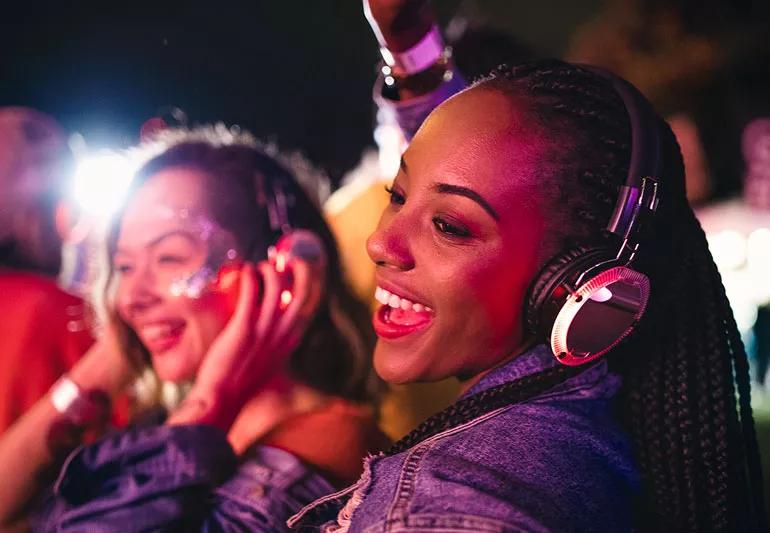Damage accumulates over time

Image content: This image is available to view online.
View image online (https://assets.clevelandclinic.org/transform/198d2005-122d-40cb-829d-48697eb75a93/wmnHeadphonesConcert-1125652935-770x553_jpg)
Women wearing headphones at concert
Earplugs aren’t exactly glamorous — but neither is saying, “WHAT?” every few minutes when you can’t understand your friend’s jokes over the restaurant’s background noise.
Advertisement
Cleveland Clinic is a non-profit academic medical center. Advertising on our site helps support our mission. We do not endorse non-Cleveland Clinic products or services. Policy
About 36 million people in the U.S. have hearing loss. A third of them ended up there because of ear damage caused by loud sounds. While noise-induced hearing loss is common, it’s also preventable, says Sharon Sandridge, PhD, Director of Clinical Services in Audiology.
She shares her tips for keeping your ears in good listening order.
People often don’t think about noise-induced hearing loss, since the damage can occur years before you find yourself struggling to keep up with the conversation.
“Loud sounds are harmful, and the damage they cause accumulates over time,” Dr. Sandridge explains. “By the time you have hearing loss show up on a hearing test, the damage is pretty significant.”
Your ears can handle a volume of about 85 decibels (roughly the volume of city traffic) for up to eight hours a day. As sounds get louder, safe listening times drop off quickly. At high volume, your smartphone headphones are around 105 dB (or more). At that level, you can safely listen for maybe four or five minutes per day.
You’d be surprised how many everyday activities and events fall on the too-loud side of the line. Some common culprits include:
Advertisement
What’s the best way to protect yourself from the onslaught of sounds? Ear protection falls in two main categories.
Earmuffs cover the entire ear like a pair of old-school headphones. They’re not exactly discrete (or stylish), but they are effective.
“Earplugs are a mixed bag,” Dr. Sandridge says.
For all earplugs, fit is key. “When you insert them, you should hear a ‘shooosh’ as the sound suddenly dies down,” she says. “You might need to experiment to find ones that fit well. If they don’t fit properly, you might as well not use them at all as they provide little to no protection.”
So go ahead and start an earplugs trend. Your future self will be glad to hear it.
Advertisement

Sign up for our Health Essentials emails for expert guidance on nutrition, fitness, sleep, skin care and more.
Learn more about our editorial process.
Advertisement
Sudden hearing loss can have many causes — but it’s important to seek treatment fast
Hearing aids can be enough for some people, but other devices — like for your phone, TV and fire alarm — can help, too
Untreated hearing loss can affect kids’ speech and language development and their overall quality of life
Reduce background noise, don’t talk too fast or too slow and above all, ask what’s most helpful to them
Ringing is already a sign of damage, but you can take steps to keep your hearing protected
Keeping your brain healthy is key
Learn how to help encourage a better quality of life
This spinning sensation is a symptom, not a condition, so you need to know what’s causing it before you can treat it
Prioritize your health by managing stress, strengthening your social connections and getting quality sleep
Bolsters, blankets, pillows and blocks can offer extra support, stability and comfort
Allergies, postnasal drip, asthma or reflux could be to blame for a cough that won’t quit